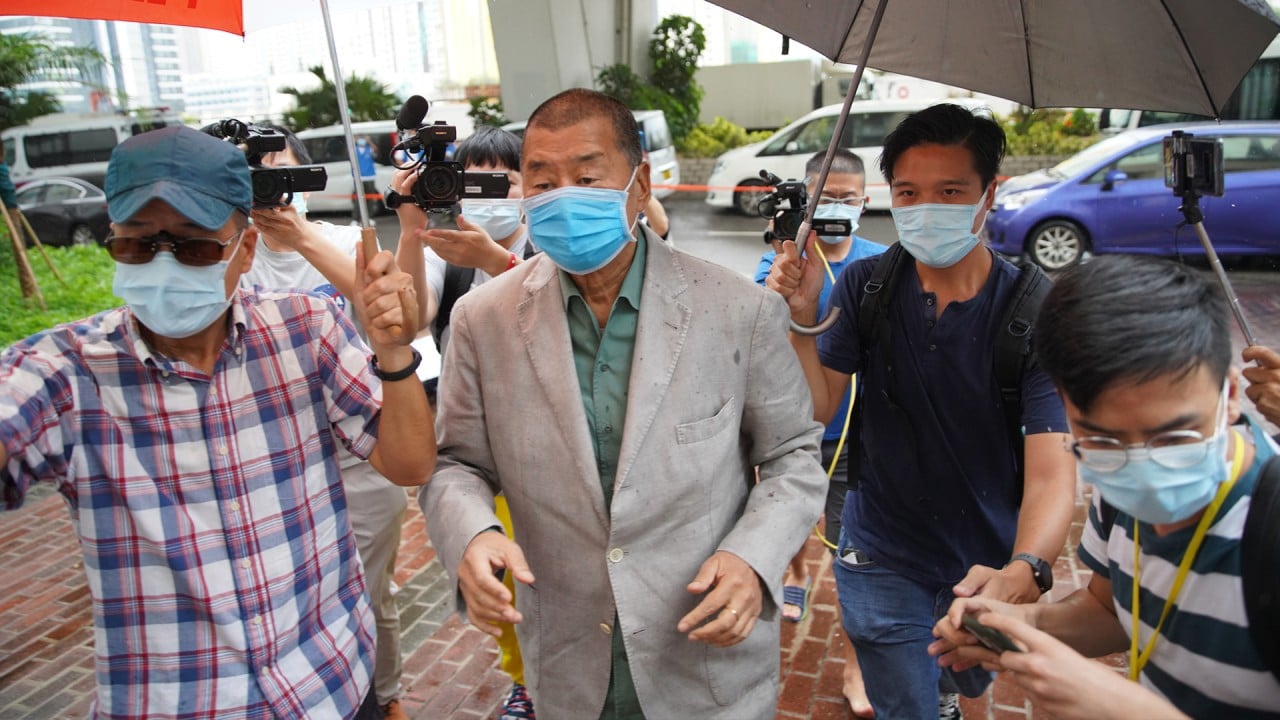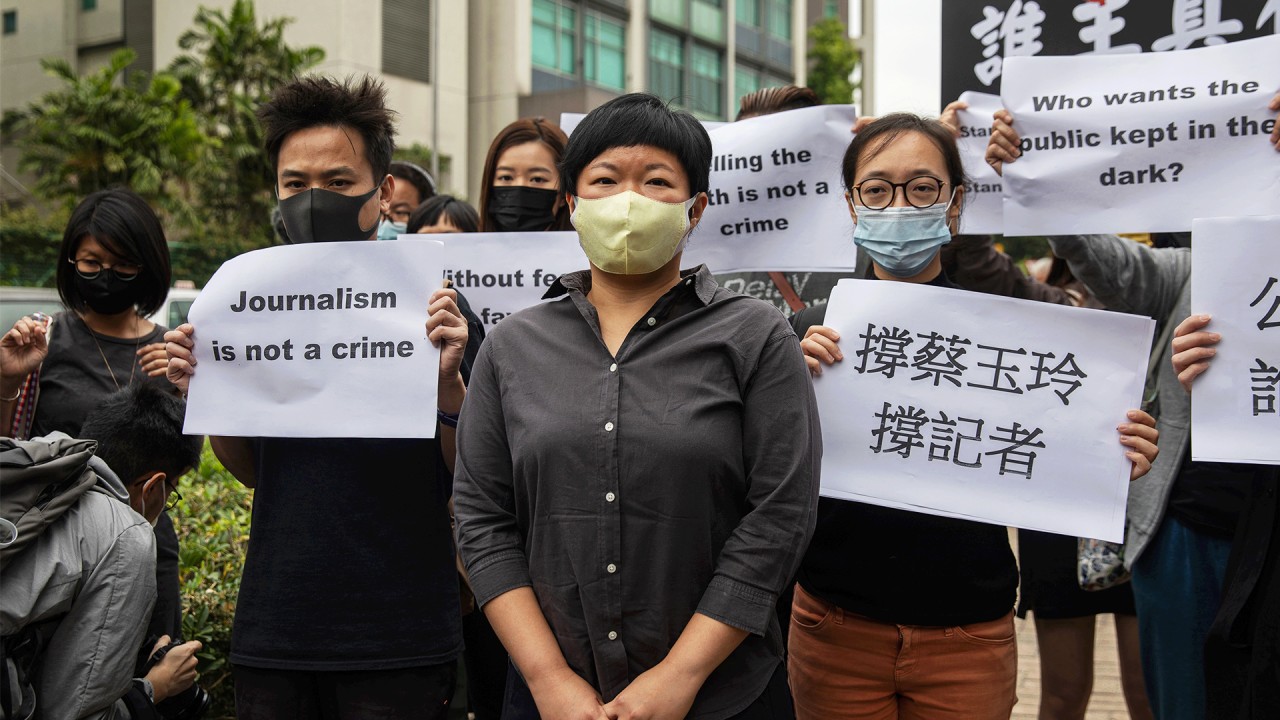
02:24
Apple Daily founder Jimmy Lai cleared of threatening reporter from rival Hong Kong newspaper

The world is becoming a more hostile place for journalists. In both online and offline spaces, journalists are confronted with threats of torture, kidnapping, harassment, imprisonment and murder. Such threats against journalists are often committed with impunity and serve to intimidate journalists and constrict media environments.
Among several worrying trends, the proportion of countries with a “very bad” media freedom ranking rose to 13 per cent this year, according to the World Press Freedom Index. Lethal attacks against journalists also remain relatively common. Although attacks have decreased slightly, Reporters Without Borders has documented that 49 journalists were killed for their work in 2019 alone.
Female journalists and media professionals also face the brunt of threats, attacks and intimidation online, further jeopardising their safety and ability to speak freely. Unaccountable digital tools such as artificial intelligence have been deployed on a massive scale to curate, moderate and censor news content online.
Surveillance, and attacks on anonymity of sources and encryption have increased the scale of the threat facing journalists and further complicated attempts to end impunity.
Hong Kong is a vibrant international city but media freedom here is under attack. The many cases of violence against media during the civil unrest last year were the starkest examples of a years-long downward trend marked also by the expulsion of foreign journalists, increasing restrictions on media access, and harassment and demonisation by political actors.

02:24
Apple Daily founder Jimmy Lai cleared of threatening reporter from rival Hong Kong newspaper
The recent arrest of an RTHK producer is also a worrying development. Once at 18th place on the World Press Freedom Index in 2002, today Hong Kong sits at 80th place. With the imposition of the national security law, media in Hong Kong – or those abroad reporting on Hong Kong – must now try to navigate vaguely defined laws in an environment of heightened scrutiny and potential punishment.
Media freedom serves a fundamental public interest, providing the information needed for good governance, to hold powerful actors to account and maintain open and stable societies. This is particularly important as the global environment for media has only worsened, facing a combination of old and emerging threats.
Attacks on media freedom can ripple throughout societies, decreasing trust, prosperity and resilience, while increasing corruption and public disorder. Given these effects, media freedom should be considered a linchpin of freedom of expression and other human rights, and attacks on media freedom should rightly be considered attacks on human rights themselves.
As the international community struggles to deal with the impact of the Covid-19 pandemic, the issue of impunity for those who attack journalists has gained even more importance.

01:56
Hong Kong journalist behind Yuen Long attack documentary charged over database search
In the face of an unprecedented “infodemic” of false or misleading information about Covid-19, the pandemic has served to underline the role of press freedom in providing societies with access to accurate information on how to protect one’s health and that of one’s community.
The pandemic has also exacerbated existing threats to media freedom by giving some governments an opportunity to further restrict journalists’ important work and leave issues of accountability unaddressed.
To counter these new and emerging challenges, journalists, civil society, governments and international organisations have joined forces to protect and promote media freedom. Canada and Britain have formed the Media Freedom Coalition, a partnership of 37 countries from around the world whose executive group also includes Germany, Ghana, Latvia, Maldives, the Netherlands and the United States.
Together, we are advocating for media freedom, online as well as offline, and for the safety of journalists and media workers. Working with Unesco, we have created a Global Media Defence Fund to support journalists in distress, cover legal expenses and initiatives, create peer support networks and support governments to develop national action plans.
On November 16, Canada and Botswana co-hosted the second Global Conference for Media Freedom, convening journalists and experts from around the world to address the most pressing challenges to media freedom.
At the conference, four new countries – Australia, Belize, Botswana and Italy – joined the 37 members of the Media Freedom Coalition for its first ministerial meeting. Members of the coalition discussed ways to strengthen international cooperation to promote and protect media freedom.
A joint ministerial communiqué was issued that reiterates the coalition’s commitment to the Global Pledge on Media Freedom and urges governments to protect the independence and safety of media professionals.
As a result of the unprecedented contemporary threats to media freedom, it is more important than ever to pay tribute to all those journalists who have lost their lives to give us the facts we need to make informed decisions for ourselves, our communities, and to hold those in power to account. We hope that you can join us as the international community takes steps to address impunity for attacks against journalists and promote media freedom worldwide.
Jeff Nankivell is consul general of Canada in Hong Kong and Macau. Andrew Heyn is British consul general to Hong Kong and Macau. Hanscom Smith is United States consul general to Hong Kong and Macau. Elizabeth Ward is consul general of Australia to Hong Kong and Macau